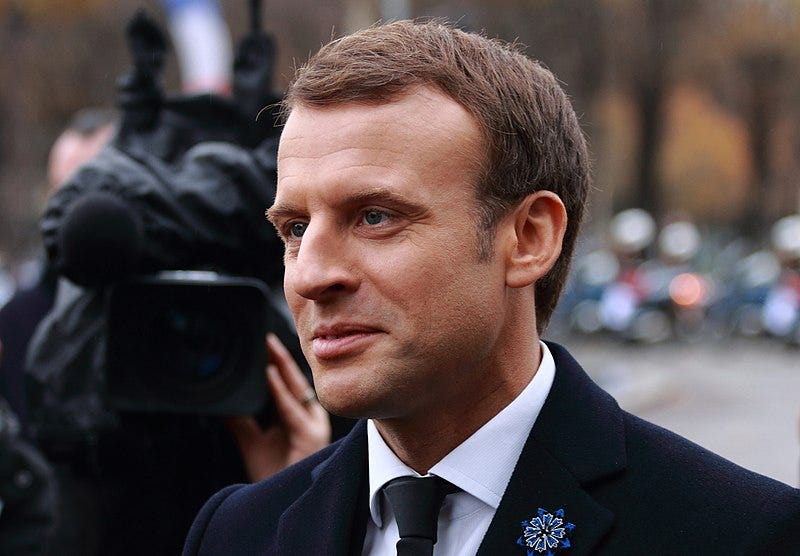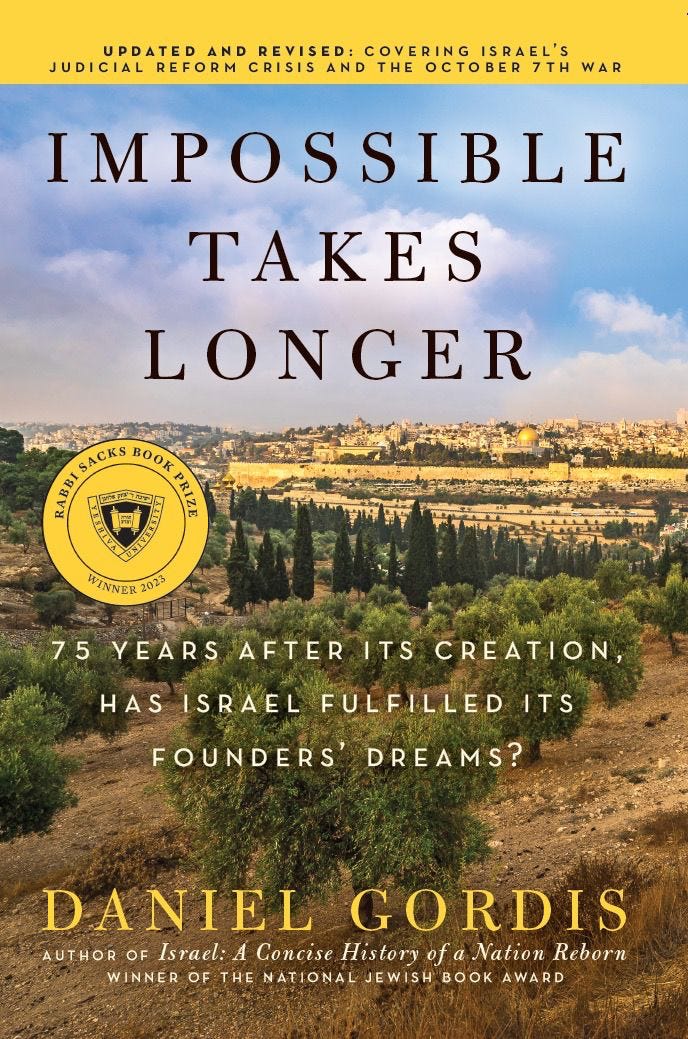Israel's Declaration of Independence foresaw Emanuel Macron
There's a very strange line in the Declaration, which seems almost childish, until one knows about the State Department, and now, France's President
It’s unfortunate that many more people know what Israel’s Declaration of Independence looks like than what it actually says. The calligraphed scroll with the stitching in the middle (a story in and of itself) has become an iconic image, widely recognized. What the Declaration actually says is much less known.
It’s only nineteen brief paragraphs, so it’s worth the read. Beware, though: the text seems much simpler than it actually is. Each sentence has a history behind it, and is the result of feverish editing and often profound disagreement among Israel’s founders. Almost every sentence has a subtext. At the end of the day, it was David Ben-Gurion who penned the final draft in the wee hours of the morning before he declared Israel’s Independence—and over the years, the genius of his text has become ever more apparent.
Today, thanks to a strange—actually, outrageous—comment by French President Emanuel Macron, we look briefly at one seemingly very odd sentence from the Declaration. It’s the second of the two sentences in the ninth paragraph, which concludes the history section of the Declaration:
On the 29th November, 1947, the United Nations General Assembly passed a resolution calling for the establishment of a Jewish State in Eretz-Israel; the General Assembly required the inhabitants of Eretz-Israel to take such steps as were necessary on their part for the implementation of that resolution. This recognition by the United Nations of the right of the Jewish people to establish their State is irrevocable.
The first sentence is simple fact, a reference to UN Resolution 181, commonly called the “Partition Plan,” dividing Palestine into two states, one Jewish and one Arab. The Arab state, of course, never came to be, because instead of accepting Partition, the Arab states attacked Israel and lost in 1948, as they did in 1967 and 1973, and as their proxies will, it appears, in 2023-2024.
But that second sentence in the paragraph is strange. “This recognition by the United Nations of the right of the Jewish people to establish their State is irrevocable.” Why say that? Doesn’t it sound like a grownup version of “finders keepers”? As in, “you gave it to me, so now this is mine and you can’t take it back?”
What’s the point of that?
When I set out, a few years ago, to write a book about whether or not we can think of Israel as a success, the most appropriate “standard” against which to measure seemed to me the Declaration of Independence. So Impossible Takes Longer looks at most of the paragraphs of the Declaration, assessing the degrees to which Israel has or has not lived up to the dreams of its founders.
Since Impossible Takes Longer was first written, Israel has gone through the Judicial Reform trauma, October 7th and then the war. So we have updated the entire text for the paperback version, rewritten to account for judicial reform, Hamas’ attack and the ongoing conflict.
Impossible Takes Longer, revised in paperback, is available here.
What a strange line! Would anyone have imagined that the decision was reversible?
What David Ben-Gurion knew—and what we no longer recall—is that after the UN vote on November 29, but even before Israel would become independent a few months later, the United States was already seeking to bring the issue back to the General Assembly for a revote.
The Department of State, under George Marshall, had long assumed a staunchly anti-Jewish-independence stance; to make matters worse for the yishuv (the pre-state Jewish community in Palestine), a day before the UN vote, a secret CIA report urged President Truman not to lend his support. The Jewish state would not be able to defend itself, the CIA had concluded, and the United States would be drawn into the conflict that was bound to ensue. “The Jews will be able to hold out no longer than two years,” the CIA predicted.
That ended up being incorrect, just as America’s prediction that a ground invasion of Gaza in 2023 would become “Mogadishu on steroids,” as General David Patraeus put it, referring to the disastrous American military fiasco in Somalia (recall the movie Black Hawk Down). Israel has suffered heartbreaking losses in Gaza, but nothing along the lines of what many Americans supposedly in the know predicted.
“The Jews,” as the CIA liked to call them, held out for much longer than two years back in 1948, and “the Jews” did much better in 2023-24 than Patraeus, the former head of the CIA, predicted.
Back then, though, the Americans had little faith in Israel’s ability to withstand an Arab attack, and just a few years after World War II, they were understandably entirely unwilling to get American troops involved in yet another war. Seeing the escalating violence in the region that followed the UN vote, they worried that it would spiral and that the United States could be drawn into the conflict. So it would be better, the State Department and others felt, to nip the problem in the bud and end the idea of a Jewish state.
On the sly, therefore, the State Department began a campaign to have the UN redo the vote on Jewish statehood, knowing that this time, the proposition would surely fail.
Keep reading with a 7-day free trial
Subscribe to Israel from the Inside with Daniel Gordis to keep reading this post and get 7 days of free access to the full post archives.





